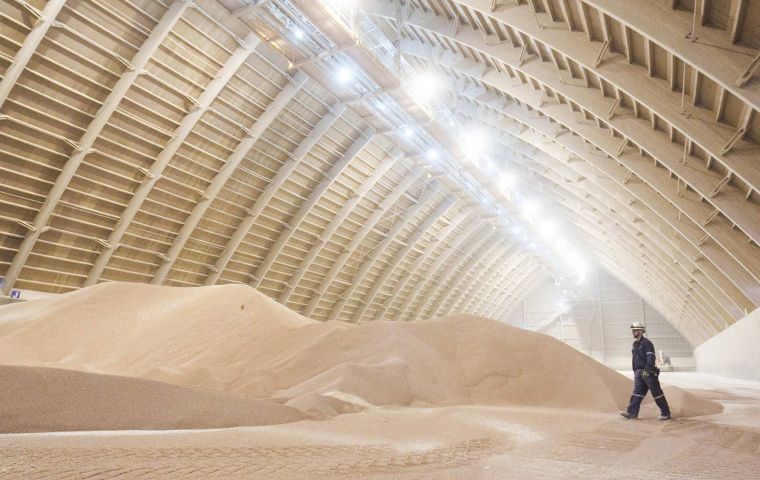MercoPress. South Atlantic News Agency
Belarus reopens sales of potash; extent of Western sanctions on Russian fertilizers not clear
 According to RIA, the Belarus government will grant potash export licenses to Belaruskali and Belarus Potash Co (BPC) as of April 6th.
According to RIA, the Belarus government will grant potash export licenses to Belaruskali and Belarus Potash Co (BPC) as of April 6th. Belarus announced that it is authorizing licenses for the export of potash beginning this month, according to the official news agency RIA. Russia's close ally is the world’s third-largest producer of potash, widely used in soy production. Belaruskali, a local state-owned company, is among the world’s leading companies in the field.
According to RIA, the Belarus government will grant export licenses to Belaruskali and Belarus Potash Co (BPC) as of April 6th.
However, despite the announcement, trade sanctions imposed by the United States and the European Union stand, and this will limit access to Western companies. But given the growing inflation in leading countries and the skyrocketing price of food staples among the most vulnerable, limited access to fertilizers could backfire and does not seem to be the wisest of policies.
In effect the US Department of Agriculture projected this week that despite robust global demand, U.S. farmers expect to cut maize plantings this spring, with high input prices such as gasoline and fertilizer restricting earnings.
Nevertheless a resolution by the US Treasury’s Office of Foreign Assets Control (Ofac), published on March 24, actually freed the fertilizers trade – among other items such as commodities – from the scope of sanctions imposed by the US on Russia. The resolution led to different interpretations and heated the market. The rule does not have a solid practical effect for some agents since there was no prohibitive sanction directed at the segment.
In turn, others advocate that now it is clear that there are no restrictions on trading with suppliers of Russian fertilizers, which is “less bad” for those in a negotiating position. The guideline may help improve the flexibility of financial operations, but the delivery of fertilizers from Russia, hampered by logistical issues, is more pressing than securing payments.




Top Comments
Disclaimer & comment rulesCommenting for this story is now closed.
If you have a Facebook account, become a fan and comment on our Facebook Page!